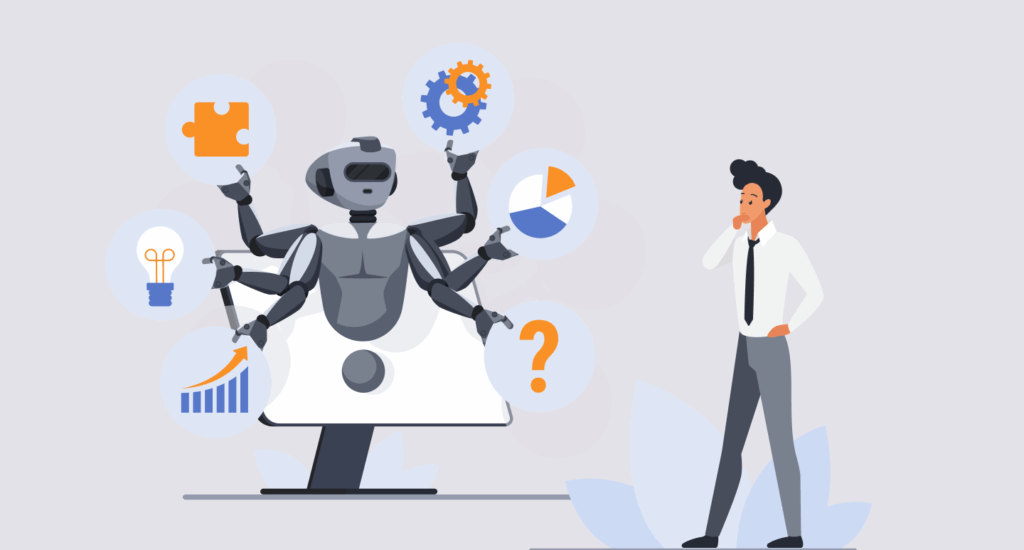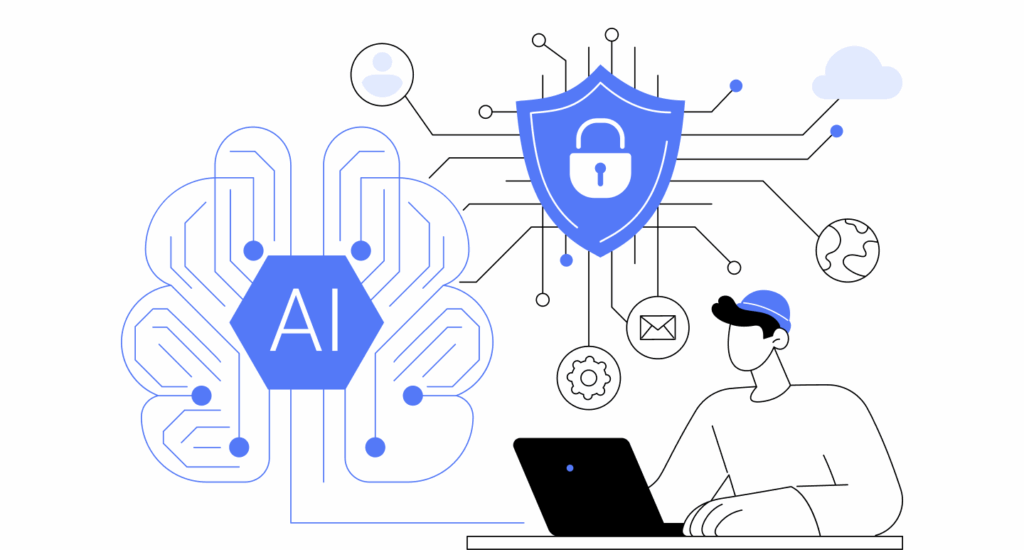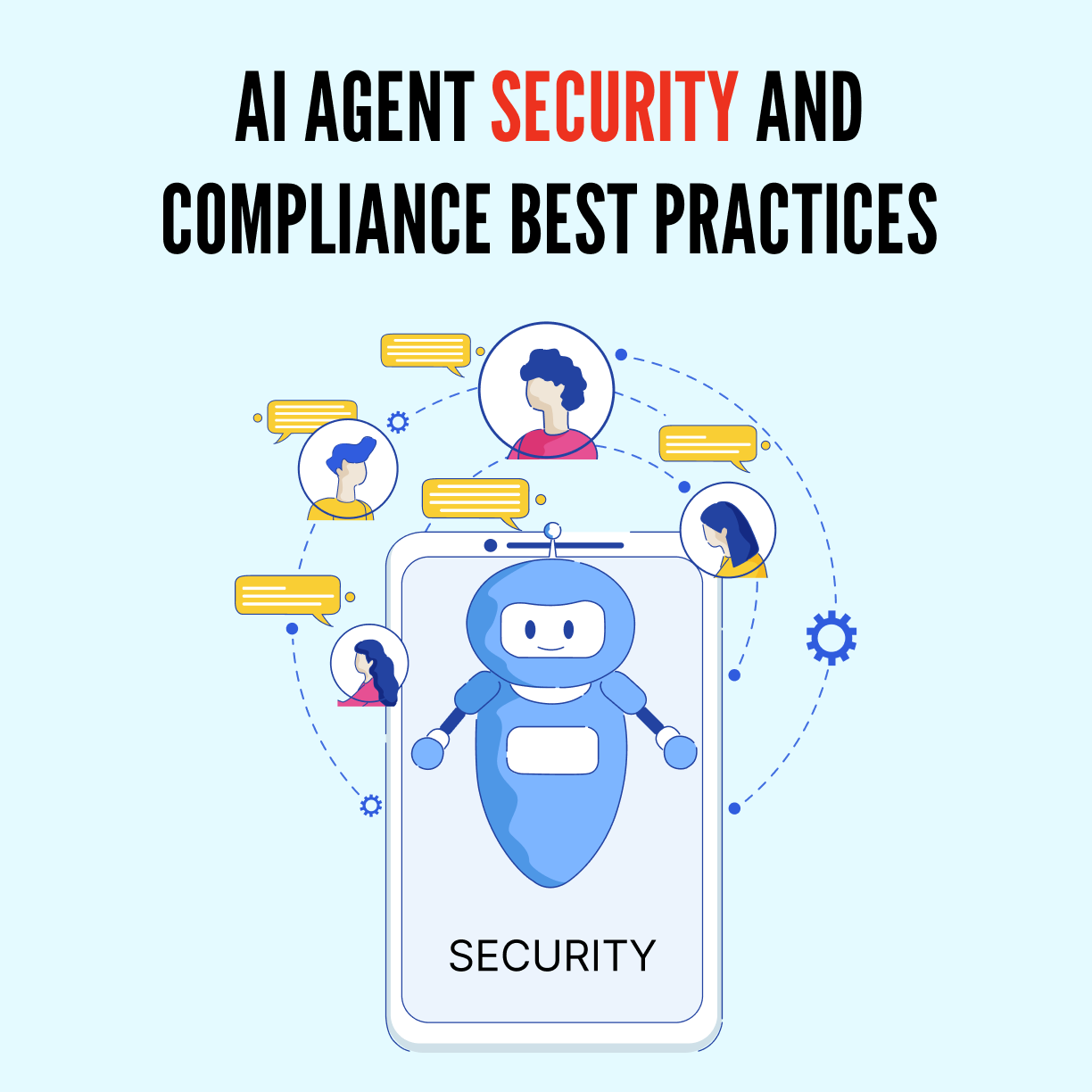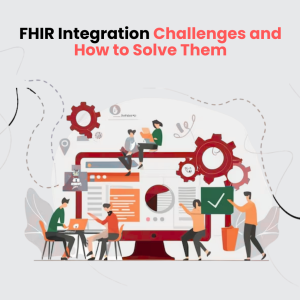|
Getting your Trinity Audio player ready...
|
An intelligent system driving an AI agent performs tasks independently or semi-autonomously. Thus, we count this technology as one of the most revolutionary technological advances of the century. From virtual assistants in customer service to predictive analytics in healthcare and fraud detection in finance, AI agents have changed the way a business operates—they have helped organisations become more efficient, data-driven, and responsive.
But with power comes a whole lot of responsibilities—a great deal of them. These AI agents would deal with massive amounts of sensitive information—names, emails, health statuses, and financial records. A security breach or a failure to adhere to regulations could cause significant damage, potentially leading to lawsuits, a loss of reputation, and a decline in consumer trust.
Why Security and Compliance Matter
Cyberattacks can also pose a threat to the AI agents. More often than not, however, they would remain targets due to their access to sensitive information and critical infrastructure. With the growing complexity and introduction of AI systems into almost every sphere of existence, keeping their security and ensuring compliance with AI agent data protection laws are no longer just AI privacy best practices but a necessity for business.
Consequences of Neglecting AI Security
Should we fail to take measures to safeguard AI agents, the following scenarios could transpire:
- A data breach exposing personal or proprietary data
- Unauthorized access to internal systems
- All the AI output would be misused by ethical or biased decisions
- Non-compliance to data regulations such as GDPR or CCPA can consenting for huge fines
The Regulatory Landscape
Global data privacy laws, including GDPR (EU), CCPA (California), HIPAA (USA), LGPD (Brazil), and emerging AI-specific frameworks like the EU AI Act, are defining the guidelines for AI’s handling, processing, and storage of data. The law requires transparency, consent, and ethical behaviour. AI agents’ decisions must be held accountable to available standards.
This blog discusses a wide matrix of AI agent security and compliance measures so that businesses can create AI systems that are safe, ethical, and compliant with regulations.
Need a customised solution for AI compliance? [Talk to our team].
Understanding AI Agent Security Risks
As with any other system, one must understand the risks AI agents may face before any defensive construction. AI agents cannot simply be viewed as traditional software. AI agents are highly dynamic in their interactions with environments, and they are trained on large datasets that are less curated. This is in contrast to traditional software, where those susceptibilities and anomalies are not present.
Risks Related to Data Privacy
AI systems mostly process PII and SPI. Improper data-handling practices may cause unauthorised access, identity theft, or exposure to confidential business information.
Privacy risks include:
- Inadvertently or accidentally retaining personal data in the training set
- Inference attacks where attackers know private information
- Proceed with inadequate anonymisation methods.
Bias and Discrimination
AI agents trained on biased data sets can replicate and even amplify societal inequalities. A case in point: a recruiting AI trained on historical hiring data may learn to prefer male candidates while marginalising others.
Discrimination in AI leads to:
- Loss of fairness and credibility
- Legal actions under anti-discrimination law.
- Harm to under-represented groups.
Vulnerabilities to Attack
AI-specific attacks include:
- Adversarial attacks: Being delivered inputs purposely crafted to fool AI systems.
- Model inversion: Reverse-engineering from outputs the training data.
- Data poisoning: Misguiding the model by corrupting training data.
Such threats compromise the accuracy, safety, and trustworthiness of AI agents.
Data Breach and Misuse
When an AI system breaches, it exposes:
- PIIs of customers
- Trade secrets
- Competitively sensitive business insights
For instance, a penalty of more than $100 million against a well-known tech company in 2024 exemplified what happens in the real world when someone neglects AI agent security standards in training data for its AI chatbot.
Unsure if your AI agent is secure? [Schedule a vulnerability assessment].
Top Security Measures for AI Agents

1. Data Encryption
Use end-to-end encryption for data at rest and in transit. Algorithms like AES-256 and secure protocols like TLS 1.3 help ensure that intercepted data cannot be read or manipulated.
AI privacy best practices include:
- Encrypting databases and data lakes
- Using secure key management systems (e.g., AWS KMS, HashiCorp Vault)
- Avoiding plain-text logging of sensitive data
2. Access Control
Implement Role-Based Access Control (RBAC) and the principle of least privilege. Only authorised personnel should access sensitive AI models, datasets, and logs.
Effective access control involves:
- Fine-grained permissions
- Regular access reviews
- Identity federation via tools like Okta or Azure AD
3. Secure Authentication
Multi-Factor Authentication (MFA) adds an extra layer of AI agent security standards beyond passwords. In high-risk environments, biometric authentication and hardware tokens (like YubiKey) can offer even more protection.
4. AI Model Protection
To prevent model theft or tampering:
- Use differential privacy to obfuscate individual data points
- Apply model watermarking to assert ownership
- Restrict external queries via rate limiting and input validation
5. Continuous Monitoring and Auditing
Deploy monitoring tools to detect anomalies in model behaviour, unauthorised access attempts, or data leakage.
Use:
- SIEM systems like Splunk or IBM QRadar
- AI observability tools (e.g., Arize AI, WhyLabs)
- Audit logs for model inference and decision tracking
Secure your AI system with our full-stack audit framework. [Learn more].
Compliance with Data Privacy Regulations
Navigating regulatory frameworks is complex, especially as global standards evolve. Each law has its nuances regarding AI and data usage.
GDPR Compliance
The EU’s General Data Protection Regulation requires:
- Explicit user consent for data collection
- Right to be forgotten
- Right to explanation for automated decisions
- Data Protection Impact Assessments (DPIAs) for high-risk AI processing
CCPA and U.S. Privacy Laws
Under the California Consumer Privacy Act:
- Consumers can request data deletion
- Businesses must disclose data-sharing practices
- Opt-out mechanisms are mandatory for selling data
CCPA and similar laws (like the Colorado Privacy Act) stress transparency and user rights.
Industry-Specific Regulations
- HIPAA mandates stringent controls over medical data. AI in healthcare must ensure PHI encryption and patient consent.
- PCI-DSS applies to financial AI systems, especially those processing payment data.
- FERPA governs student data privacy in education.
Data Minimization and Retention
Collect only what is necessary. Implement automated data deletion and anonymisation to meet retention limits. This method reduces risk and cost.
Unsure which laws apply to you? [Talk to our AI compliance advisors.]
Best Practices for AI Agent Compliance

Accountability and Transparency
AI agents need to coherently inform their decisions—especially in the sectors of finance, healthcare, or law.
Implement:
- Explainable AI (XAI) frameworks
- Model Cards
User Consent and Control
Create intuitive interfaces for users to:
- Understand what data is collected and why
- Opt in/out of data sharing
- Access, download, or even delete their data
Use dynamic consent that adapts with user preferences.
Regular Data Audits and Updates
Conduct:
- Periodic privacy audits
- In-house assessments of AI fairness
- Updates of consent notice and documents
AI Ethics Necessary Considerations
Ethical AI framework alignment as per the following principles:
- Fairness
- Transparency
- Accountability
- Inclusiveness
Creating an internal ethics board or review committee to oversee.
Make ethics your AI’s superpower. [Partner with our AI ethics team].
Building an AI Agent with Secure and Compliant Data Handling
AI agent security standards should consider and follow AI regulations throughout the development process, from inception to deployment.
Privacy by Design
Begin with privacy as a core principle. This includes:
- Pseudonymised sensitive input
- Minimal exposure through design
- Security embedded in the architecture
Data Encryption in Storage and Transit
Ensure that:
- Use client-specific tools for encryption of cloud storage (for instance, AWS S3 encryption).
- API traffic secured with HTTPS and mTLS
Auditing and Logging
Afford immutability in the logs to trace:
- Who accessed the system?
- When, why, and what he/she did
- Which decisions the AI made
- Use log aggregation tools like ELK Stack or Datadog.
Secure Training Data
Usage of:
- Anonymised datasets.
- Federated learning for decentralised data training.
- Synthetic data generation to reduce reliance on real data.
Need to secure your AI training pipeline? [Book a technical workshop].
Challenges in AI Agent Security and Compliance
Balancing Requirements and Usability
Security mechanisms like MFA and encryption introduce friction. The ultimate aim is to develop features that are secure by default without compromising user experience.
The Changing Regulatory Environment
As AI-specific legislation is being crafted at a rapid pace, businesses must adjust quickly and proactively to such laws as the EU AI Act or the U.S. Algorithmic Accountability Act.
- EU AI Act
- U.S. Algorithmic Accountability Act
- Digital Personal Data Protection Act (DPDP) of India
Gain and Retain Users’ Trust
Public opinion on AI privacy best practices has been skeptical. There should be transparent communication and ethical practices to gain user trust.
Legacy Compatibility Integration:
Older infrastructures are often not compatible with modern AI agent security standards. An incremental upgrade with the use of middleware can help fill the gap formed by this change.
Are you encountering challenges with integration? [Let’s modernise your stack.]
Tools and Technologies for Ensuring AI Agent Security and Compliance

Encryption Libraries
- OpenSSL: Widely used open-source toolkit
- GPG (GNU Privacy Guard): For encrypted communications
- Libsodium: Modern and secure cryptographic library
Compliance Platforms
- OneTrust: Manages consent, DPIAs, and data mapping
- TrustArc: Privacy risk assessments and reporting
- ComplyAdvantage: AML and data AI compliance for financial institutions
AI Ethics Tools
- IBM AI Fairness 360: Bias detection toolkit
- Google Fairness Indicators: Helps analyze model outputs across demographics
- Microsoft Fairlearn: Measures and mitigates unfairness
AI Security Platforms
- AWS Shield: DDoS protection for AI endpoints
- Google Chronicle: Security analytics and threat detection
- Azure Security Center: Unified security for Azure-hosted AI
Need help selecting the right tools? [Request a technology consultation].
Case Studies of AI Agent Security and Compliance
Case study 1: Banking Chatbot with End-to-End Encryption
Designed to operate in an environment secured by regulatory guidelines, such as PCI-DSS, the secure AI chatbot implemented by this financial institution provided encrypted messaging, included user consent flows, and made use of real-time fraud monitoring to raise customer trust and chat sessions by over 25% in the overall acceptance rating.
Case study 2: AI in Healthcare and HIPAA Compliance
Using federated learning methodology, a telehealth startup trained AI models without exposing raw patient data to their systems. They met HIPAA requirements by preserving patient data via a privacy-safe method, which also enabled them to scale significantly faster.
Case Study 3: Retailer Adapts to CCPA
The retail eCommerce brand has updated its AI personalisation engine to include opt-out features and custom data retention settings. They achieved CCPA compliance and saw an increase in customer goodwill.
Curious about our clients’ success stories? [Explore case studies].
What Makes Esferasoft the Best Partner for Developing Secure and Compliant AI Agents?
AI should not just be intelligent but also secure, ethical, and compliant in today’s data-driven business environment. The requisite capability of Esferasoft to integrate technical prowess alongside a security-conscious mindset ensures AI agents are built to the highest standards of database protection and regulatory AI compliance.
Security by Design
The AI that we build is made with
- End-to-end encryption
- Strong access control with MFA
- Secure cloud infrastructure (AWS, Azure, GCP)
- Model protection from adversarial attacks and data leaks
We ensure that your AI is protected all the way from data pipelines until model deployment.
Compliance Built-In
Esferasoft builds world-class AI agents that comply with
- GDPR
- CCPA
- HIPAA
- PCI-DSS
Conducting privacy impact assessments, implementing consent workflows, and delivering documentation levels that keep you ahead of regulations are part of our services.
Ethical and Transparent AI
We help you establish trust through:
- Build bias-free models using Fairlearn, and AI Fairness 360 tools
- Explainable AI to make decisions transparent
- User data controls such as access, consent, and deletion
Industry-Proven Solutions
From healthcare to finance to eCommerce, we deliver secure, compliant AI agents tailored to industry-specific standards.
Ongoing Support
After launch, we provide
- Monitoring and security audits;
- Model retraining using secure data;
- Updates to regulatory compliance.
Want to build a secure and compliant AI agent? [Talk to Esferasoft today.]
A Secure and Compliant AI Future
AI agents are neither tools nor artificially competent mechanisms. They are, rather, decision-making engines, authoritative dexters of data, and customer-facing representatives of organisations. It is crucial to secure and follow them to avoid legal risk, safeguard user data, and maintain public confidence.
Investing in AI agent security, building systems that align with global compliance frameworks, and committing to ethical development are no longer optional; they are foundational.
Security and compliance are necessary for both user trust and the legally binding nature of your AI agent.[Contact us at +91 772-3000-038 for expert guidance on developing secure, compliant AI agents for your business.]



